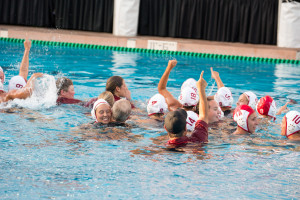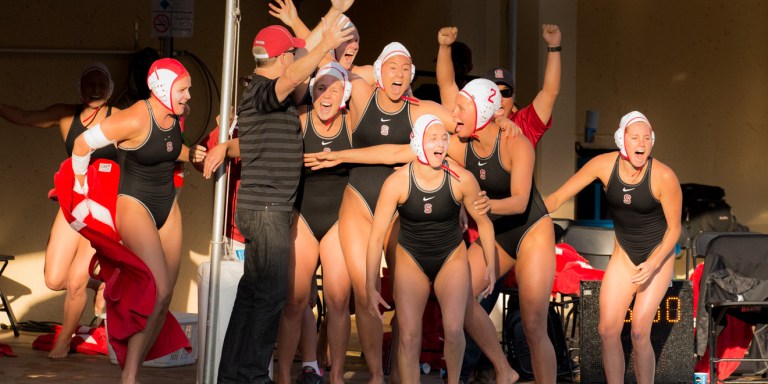Championships are won on a series of small moments, and sometimes one singular shot can make all the difference. Those in attendance at Avery Aquatic Center on Sunday saw the culmination of those small moments into one final triumph as Stanford bested UCLA 7-6 to stand alone atop the water polo world.
With 11 seconds on the clock in the final quarter of the NCAA women’s water polo national championship game, Kiley Neushul drilled the ball into the bottom right corner past UCLA goalie Sami Hill on a penalty shot following a controversial call, breaking the 6-6 tie and sealing Stanford’s fourth national title in five years.

The penalty shot came after Maggie Steffens’ shot on a power play was saved by UCLA goalie Sami Hill. Hill had attempted to clear the ball, and Bruin head coach Brandon Brooks called a timeout. Yet the referees ruled that UCLA did not have possession of the ball when the timeout was called, a violation that, according to a new rule implemented last September, rewards the opposing team with a penalty shot.
“I’m just incredibly proud of my team. They have been sensational throughout the year putting themselves in this position and they have responded every time,” said Stanford head coach John Tanner. “Today, that fourth quarter was a crazy adventure. Tons of perseverance and we just showed a lot of character for our team. Just couldn’t be prouder of our group and the leadership we’ve had.”
The title marks the 39th consecutive academic year that Stanford has won a national championship. 16 of the school’s 106 championships have been won by a Stanford water polo team, five of which are from the women’s side. Stanford is also the first host team in the 15-year history of the NCAA water polo tournament that has won the title.
“We came in during the third-place game, and I thought, ‘Man, this is a championship atmosphere. This is a championship game,’” Tanner said. “It’s too good, this whole atmosphere. There is a lot of pressure when you host and a lot of distractions, but these guys — it’s incredible: the leadership, the maturity. They’ve put us in a position where they’re just fearless about any situation.”
Kiley Neushul stepped up in a huge way after having a history of not performing well on the NCAA stage in years past. “Honestly, I’ve never had a good NCAA tournament. Ever. So this was nice. Nice to come out feeling good,” Neushul said.
She scored five of the team’s goals — senior Ashley Grossman scored the other two — including all of the Cardinal’s goals in the second half. The senior also impressed on the defensive end, notching a team-high five steals.
“Kiley is a fantastic player. Kiley is on any given day one of the best players in the world,” Brooks said.
Another stellar performance came from Maggie Steffens, who won the tournament’s MVP award after notching 7 goals in the first two games and three assists in the final. Junior goalie Gabby Stone also had an impressive day on Sunday, tallying 9 saves against a persistent Bruin attack.
The game mostly consisted of Stanford going up by a goal and UCLA responding with a goal of its own and tying the game. The Bruins did lead for just under three minutes, when a goal from Charlotte Pratt at the end of the first quarter put them up 3-2, an advantage they would maintain until a power play goal from Ashley Grossman tied everything back up at the 5:37 mark in the second half.
After a Kiley Neushul goal at the beginning of the third quarter, Stanford held onto a 5-4 lead going into the final quarter. Although UCLA had once again tied the game, Stanford quickly responded with another goal, holding a one-goal advantage before UCLA’s Pratt scored the game-tying goal with 2:45 to play. Several defensive stops for both teams over the next few minutes led to the final Stanford possession and the fatefully mistimed timeout call and ensuing penalty shot that earned Stanford the win.
The Stanford-UCLA rivalry all year has been intense, to say the least. Emotions seeped over from last year’s national championship game in which Stanford beat UCLA 9-5. In that matchup, Stanford scored six unanswered goals in the second half after trailing 5-3 at halftime — a much different game than this year’s.
The rivalry extended throughout the season, when the two teams met each other three times before the NCAAs. In early February, Stanford came out with a 10-6 win behind three goals from junior Anna Yelizarova, before three weeks later falling to the Bruins in overtime at the UC Irvine Invitational. The Cardinal rebounded in April with an 8-7 victory at Avery, in which the Neushul sisters scored two goals apiece.
“I was just completely trusting of my teammates. I wasn’t nervous at all,” Stone said. “We’ve been talking about this all year, and I felt so prepared with that atmosphere, with the [semifinal] game against USC. We knew what it was going to be like in that championship game, and I was completely faithful in my team and what they could do and in my teammates, in what they could do, and in what I could do too.”
UCLA and Stanford traded spots as the No. 1 team in the country throughout this season, with UCLA coming into the tournament as the No. 1 team after Stanford had lost to Cal in the MPSF tournament. UCLA and Stanford undoubtedly stood above the rest of the nation, even USC and Cal, as the two best teams in the nation. Based on the past two games between these two teams, and the championship game itself, it was either team’s to win.
“My sense was that we were not going to be denied,” Tanner said. “With that atmosphere, I’d like to still be out there coaching. I think these guys would like to still be out there playing. It was absolutely incredible.”
Contact Alexa Philippou at aphil723 ‘at’ stanford.edu.
